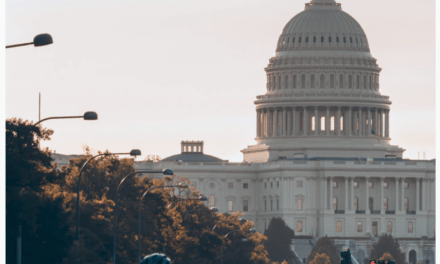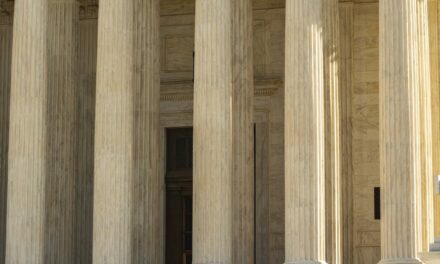We support our Publishers and Content Creators. You can view this story on their website by CLICKING HERE.

In the year after the momentous decision of Dobbs v. Jackson Women’s Health Organization, the pro-life movement has accomplished tremendous victories, as well as tackled new challenges. It has been an eventful year as the battle for Life continues in the state legislatures, at the ballot, and in the courts. Here are the top ten developments in the Life arena of 2023, as the Americans United for Life (AUL) legal staff see them:
10. FDA’s Approval of Casegevy:
Challenge.
On December 8, 2023, the U.S. Food and Drug Administration (FDA) approved Casegevy, which is the first therapeutic application of CRISPR, the gene-editing technology. Casegevy is approved for a one-time gene therapy that modifies the stem cells of patients with severe sickle cell disease. It is reported that the treatment requires lengthy hospitalization and may destroy a patient’s fertility in severe cases.
9. Litigation over the Emergency Medical Treatment and Labor Act (EMTALA) Continues:
Win & Challenge.
There has been significant development in litigation over EMTALA, which requires hospitals to provide stabilizing care to patients in emergency situations. In State of Texas v. Becerra, which is a pro-life challenge to the EMTALA abortion mandate, the district court entered a permanent injunction against the abortion mandate in January of this year. This decision has been appealed to the Fifth Circuit and AUL filed a friend-of-the-court brief in support of the pro-life plaintiffs’ position. Conversely, in State of Idaho v. United States of America, Idaho’s trigger law was challenged by pro-abortion plaintiffs, who argue that Idaho’s law is preempted by EMTALA. In 2022, the district court granted a preliminary injunction against the law. This year, the case was appealed to the Ninth Circuit, and is currently set for oral argument in January 2024.
8. Battles over Pregnancy Resource Centers (PRCs):
Win & Challenge.
In 2023, several states proposed unconstitutional legislation that targeted PRCs because of their pro-life views. For example, Colorado, Illinois, and Vermont passed laws to penalize PRCs for alleged “deceptive advertising.” Thankfully, in December, the district court in National Institute of Family and Life Advocates v. Raoul issued a permanent injunction against the Illinois law targeting PRCs, and the Illinois Attorney General agreed not to enforce the law. Despite some states targeting PRCs, several other states have recognized the invaluable services PRCs provide to women and families and have enacted legislation supporting PRCs. Both Louisiana and North Dakota enacted laws that created a tax credit for donations to PRCs. Arkansas, Florida, Tennessee, and Texas also provided significant funding to PRCs.
7. Proposed Administrative Rules Touching on Life Issues:
Challenge.
This year, several federal administrative agencies published Proposed Rules that touched on life issues. The Drug Enforcement Administration published a Proposed Rule that restricts telemedical prescriptions for Schedule II drugs and narcotics unless the practitioner has a qualifying telemedicine referral. HHS published a Proposed Rule that lessens conscience protections under the Affordable Care Act Contraceptive Insurance Mandate. HHS also published a Proposed Rule that weakens abortion and assisted suicide conscience safeguards. Lastly, the Equal Employment Opportunity Commission published a Proposed Rule, rewriting language from the Pregnant Workers Fairness Act to contrive protections for elective abortions. AUL filed comments on all four proposed rules.
6. Decrease in the Number of Abortions in South Dakota:
Win.
Due to South Dakota’s strong protections for life, the state has seen a dramatic decrease in the number of abortions. This year, South Dakota released its abortion reporting data for 2022. The report noted that the number of abortions decreased to 137 for 2022. That is down from 414 abortions in 2019, which is a 67% decrease.
5. Defeat of Physician-Assisted Suicide Bills:
Win.
The pro-life movement along with disability rights groups successfully opposed efforts to legalize physician-assisted suicide in the states. As a result, no new states have legalized suicide by physician in 2023. Notably, Nevada Governor Joe Lombardo vetoed a bill that would have legalized physician-assisted suicide. AUL renewed its efforts against assisted-suicide this year, publishing a policy report on the topic and releasing updates on legislative and litigation efforts to legalize and expand physician-assisted suicide.
4. Litigation over State Constitutions:
Win & Challenge.
Litigation has ensued in several states over the question of whether a “right” to abortion is protected in state constitutions, including in South Carolina, Indiana, Oklahoma, Idaho, and Kentucky. One prominent example is Planned Parenthood South Atlantic v. State of South Carolina (Planned Parenthood I). In January, the South Carolina Supreme Court found a privacy right to abortion within the state constitution. Later in August, after the legislature enacted a new heartbeat law, the South Carolina Supreme Court upheld the state’s heartbeat law in Planned Parenthood South Atlantic v. State of South Carolina (Planned Parenthood II, finding that the law does not violate the state constitutional right to privacy.
3. Strong Protections for Life Enacted:
Win.
During the 2023 legislative sessions, at least 59 life-affirming laws have been passed and signed into law. Wyoming led the pack by enacting its Life is A Human Right Act, which protects life from the moment of conception. This law was modeled after AUL’s model bill, Ready for Life Act. Florida, Iowa, and South Carolina followed suit and enacted laws prohibiting abortion after fetal heartbeat law is detected. Both Nebraska and North Carolina enacted protections that prohibit abortions after 12 weeks. Some of these laws have been challenged and are currently being litigated in court.
2. Issue 1 In Ohio:
Challenge.
The push to enshrine an unfettered “right” to abortion in state constitutions has become an emerging threat to life in 2023. In November 2023, Ohioans voted to amend their state constitution to protect the “right” to abortion. Many states will face similar challenges to their state constitutions in 2024. AUL released a policy report on Issue 1 in Ohio, noting the negative legal implications of enshrining a “right” to abortion in Ohio’s state constitution.
1. Alliance for Hippocratic Medicine, et al. v. Federal Food and Drug Administration, et al.:
Win & Challenge.
The battle over chemical abortion drugs has stolen the prime spotlight in 2023. After the district court ruled in favor of the pro-life plaintiffs and granted a stay of the FDA’s original 2000 approval and subsequent deregulation of the chemical abortion two-drug regimen, this case has made its way to the Supreme Court twice this year. Recently, the Supreme Court has decided to review the FDA and Danco Laboratories’ petitions and decide whether the FDA’s actions in removing patient safeguards in 2016 and 2021 were lawful. During the litigation, both the district court and the Fifth Circuit found the FDA’s actions in removing necessary patient protections for women seeking chemical abortion pills in 2016 and 2021, were unlawful. AUL has urged the Supreme Court to do the same, filing a friend-of-the-court brief on behalf of 109 pro-life members of Congress.
The Movement Marches On
2023 has proven to be an action-packed year for life. Although the pro-life movement has faced new challenges, the movement has remained dedicated to the common goal of seeing all life welcomed and protected in law. We are confident that we will continue to see additional pro-life victories in 2024.

 Conservative
Conservative  Search
Search Trending
Trending Current News
Current News 




